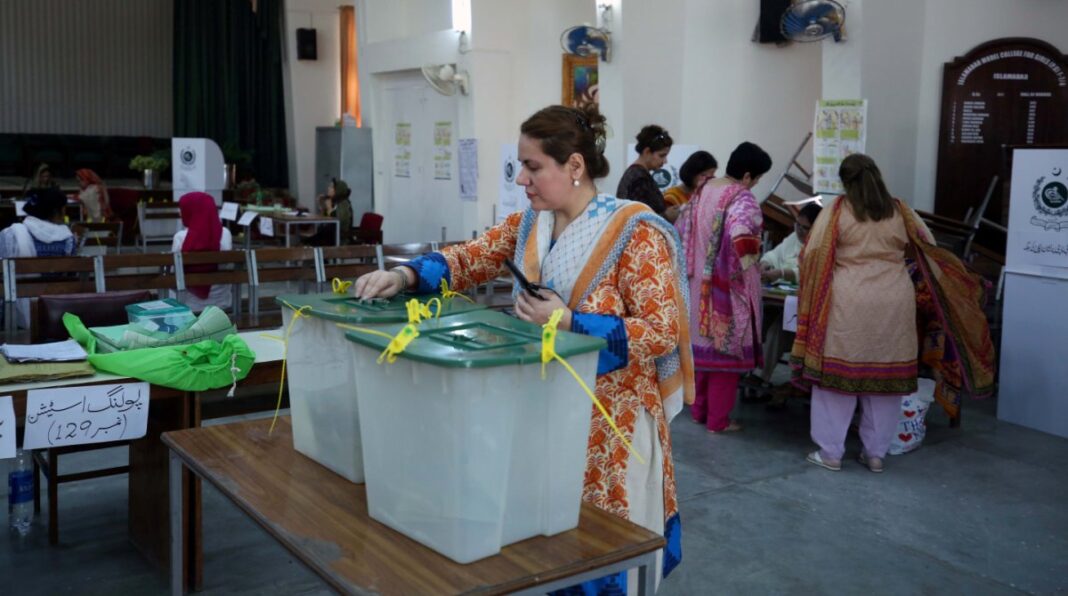Electoral participation of women in Pakistan has long been an issue. FAFEN brings to light a number of reasons.
The electoral participation of women in Pakistan can be gauged by their turnout in the general elections. The female voter turnout in General Elections (GE) 2018 was comparatively lower than the male voter turnout across the country and across assemblies. About 46.89 percent of registered women voters cast their ballots for the National Assembly seats in comparison to 56.07 percent of registered men voters.
In Pakistan, cultural and societal norms act as barriers, impeding women’s active participation in the public sphere. This also hinders political and electoral participation of women. Nevertheless, the low turnout cannot be solely attributed to these specific factors. FAFEN undertook an exhaustive study to delve into the challenges to women’s participation in political and electoral realms. The study identified a spectrum of challenges faced by women, hindering their increased participation in these spheres.
Electoral Participation of Women: Is There Freedom of Choice in Voting?
Women often depend on the male members of their families for various aspects of civic participation. The process of obtaining a National Identity Card (NIC) necessitates the presence of a supportive male family member; otherwise, women face challenges in registering for one. Even if granted the opportunity to cast votes, their decision-making authority is often relinquished to the head of the family. Instances have been reported where male family members took possession of women’s NICs and cast votes on their behalf. Another notable issue is the women are predominantly employed in domestic work or factories. This employment situation poses a barrier to their ability to take time off for voting, as they prioritize the responsibility of providing for their families.
Attitude of Polling Staff and Crowded Polling Stations
The study concluded that a significant number of female voters, particularly those from rural areas, lacks awareness of the polling process. Instead of receiving assistance, numerous women, particularly in Khyber Pakhtunkhwa (KP), had voiced complaints about the behavior of the polling staff. These negative attitudes ultimately act as deterrents, discouraging women from actively participating in the voting process.
“Women have to wait for hours to cast their vote. So, in case a woman is not comfortable in standing in queue for hours, she will not be able to cast vote”
Complaints regarding overcrowding of polling stations have been reported, especially by women who have multiple responsibilities and domestic chores to attend to. Delays caused by overcrowding may discourage many from stepping out. Additionally, there have been reports of harassment at these polling stations, further compounding the challenges faced by women attempting to exercise their voting rights.
Electoral Participation of Women: The Role of Distant Polling Stations
Accessibility to polling stations has emerged as a significant challenge for women in rural areas, particularly in hilly terrain. Some women have voiced concerns that polling stations are situated at a distance from the population, making them less accessible for most people, especially female voters. This lack of accessibility serves as a discouraging factor, contributing to lower turnout among women..
“Women in our district encounter barriers that hinder their participation in the electoral process. The hilly terrain of Swat poses challenges, with distant polling stations causing difficulties for people, especially female voters. While candidates from political parties often arrange transport for female voters, numerous other issues persist at polling stations. These include long queues, errors in names on voter lists, and an unfriendly attitude from polling staff, collectively impeding the smooth participation of women in the electoral process.”- Swat.
“Women have to face many problems including distance between polling stations and residential areas” - Attock
Errors in Voter Lists
Another prevalent issue reported is the inaccuracies in the names of women voters, preventing them from casting their votes. In many cases, these errors in the voter lists serve as obstacles to the electoral participation of women. Similarly, there are instances where the names of women voters are absent from the polling stations in their own areas, further complicating their ability to exercise their voting rights.
Electoral Participation or Women and Problems in NIC Registration
Reports indicate that certain NADRA offices employ male photographers, leading to reluctance among many families to pursue the registration of National Identity Cards (NIC) for women. Moreover, women have reported encountering behavioral issues with the staff, which has dissuaded them from visiting these offices. Given that NIC registration is a prerequisite for voting, these claims underscore the need for an introspective approach towards policies that specifically address the concerns and challenges faced by women in this regard.
Significant strides have been made to ensure a greater women voter turnout. While the cultural barriers remain and would require a larger overhaul and advocacy, coupled with legislation to ensure greater women’s participation. The technical issues highlighted above are more precise, and concerted efforts are warranted by relevant authorities.


